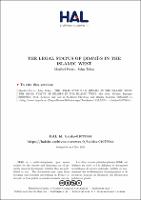The Legal status of ḏimmī-s in the Islamic West
(second/eighth-ninth/fifteenth centuries)
| dc.contributor.editor | Fierro, M | |
| dc.contributor.editor | V. Tolan, J. | |
| dc.date.accessioned | 2018-08-08 11:18:34 | |
| dc.date.accessioned | 2020-04-01T13:03:17Z | |
| dc.date.available | 2020-04-01T13:03:17Z | |
| dc.date.issued | 2013 | |
| dc.identifier | 644656 | |
| dc.identifier | OCN: 880503564 | en_US |
| dc.identifier.uri | http://library.oapen.org/handle/20.500.12657/30624 | |
| dc.description.abstract | The first monograph devoted to the legal status of religious minorities status accorded to dimmī-s ( Jews and Christians) in the Muslim law in the medieval Muslim west (the Maghreb and Muslim Spain). The articles in this volume provide numerous examples of the richness and complexity of interreligious relations in Medieval Islam and the reactions of jurists to those relations. The studies brought together in this volume provide an important contribution to the history of ḏimmī-s in the medieval dār al-islām, and more generally to the legal history of religious minorities in medieval societies. The central question addressed is the legal status accorded to ḏimmī-s (Jews and Christians) in the Muslim law in the medieval Muslim west (the Maghreb and Muslim Spain). The scholars whose work is brought together in these pages have dealt with a rich and complex variety of legal sources. Many of the texts are from the Mālikī legal tradition; they include fiqh, fatwā-s, ḥisba manuals. These texts function as the building blocks of the legal framework in which jurists and rulers of Maghrebi and Peninsular societies worked. The very richness and complexity of these texts, as well as the variety of responses that they solicited, refute the textbook idea of a monolithic ḏimmī system, supposedly based on the Pact of ‘Umar, applied throughout the Muslim world. In fact when one looks closely at the early legal texts or chronicles from both the Mashreq and the Maghreb, there is little evidence for a standard, uniform ḏimmī system, but rather a wide variety of local adaptations. The articles in this volume provide numerous examples of the richness and complexity of interreligious relations in Medieval Islam and the reactions of jurists to those relations. | |
| dc.language | English | |
| dc.language | French | |
| dc.language | Spanish; Castilian | |
| dc.subject.classification | thema EDItEUR::Q Philosophy and Religion::QR Religion and beliefs::QRA Religion: general::QRAX History of religion | en_US |
| dc.subject.other | religious minorities | * |
| dc.subject.other | jews | * |
| dc.subject.other | christians | * |
| dc.subject.other | legal status | * |
| dc.subject.other | Al-Andalus | * |
| dc.subject.other | Brepols | * |
| dc.subject.other | Islam | * |
| dc.subject.other | Muslims | * |
| dc.subject.other | Textbook | * |
| dc.title | The Legal status of ḏimmī-s in the Islamic West | |
| dc.title.alternative | (second/eighth-ninth/fifteenth centuries) | |
| dc.type | book | |
| oapen.identifier.doi | 10.1484/M.RELMIN-EB.6.09070802050003050408050408 | |
| oapen.relation.isPublishedBy | 921d3788-38a8-4c25-b98d-1550c80a40c6 | |
| oapen.relation.isFundedBy | 7292b17b-f01a-4016-94d3-d7fb5ef9fb79 | |
| oapen.relation.isbn | 9782503548890 | |
| oapen.collection | European Research Council (ERC) | |
| oapen.pages | 416 | |
| oapen.place.publication | Turnhout | |
| oapen.grant.number | 249416 | |
| oapen.grant.program | RELMIN | |
| oapen.remark.public | Relevant Wikipedia pages: Al-Andalus - https://en.wikipedia.org/wiki/Al-Andalus; Brepols - https://en.wikipedia.org/wiki/Brepols; Islam - https://en.wikipedia.org/wiki/Islam; Muslims - https://en.wikipedia.org/wiki/Muslims |

